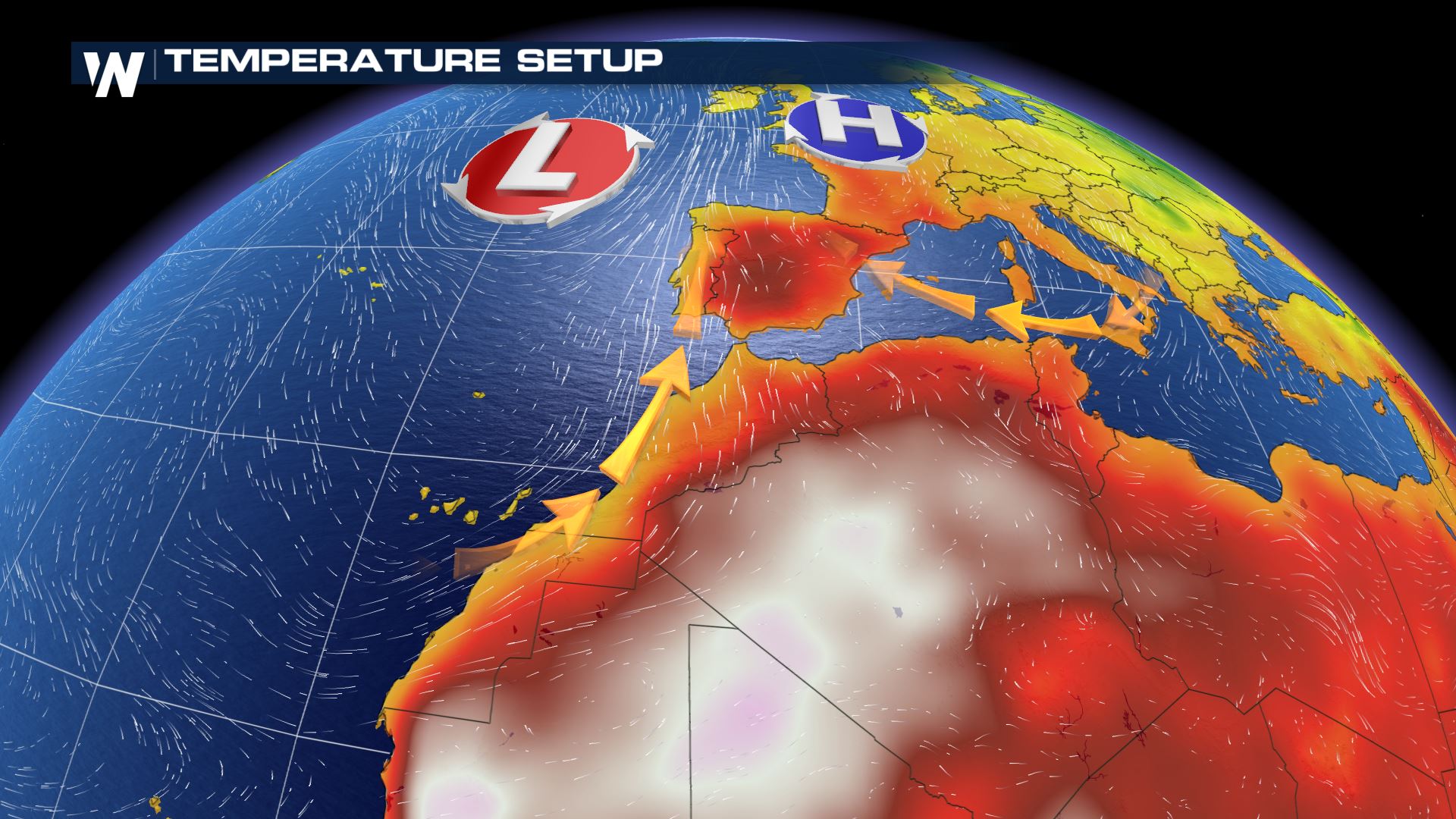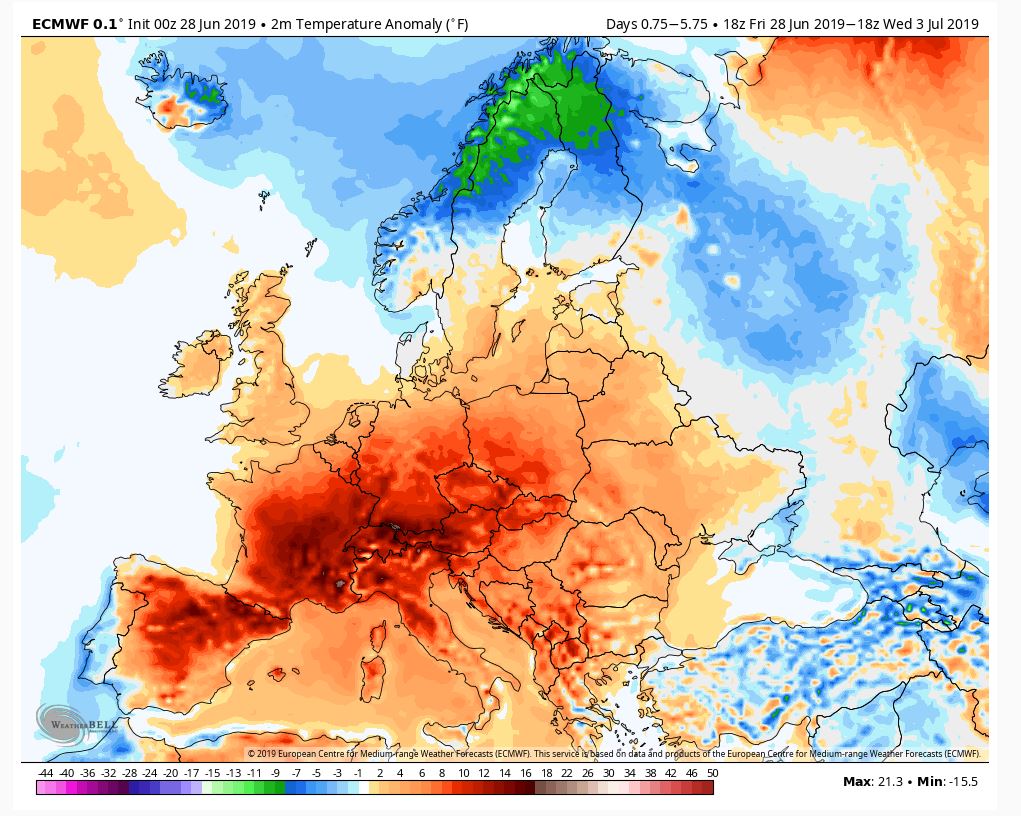All-Time Record Heat Grips Europe
Special Stories
28 Jun 2019 8:28 AM
Europe is in the midst of an extreme heat wave, with record setting heat and high temperatures across many European cities.
On Friday, June 28, France's official meteorological agency, Meteo-France, announced the country's all-time high temperature record had been broken at a sweltering 114.6 F (45.9 C). The record was observed in the southern town of Gallargues-le-Montueux. This temperature is an all time record for the country, meaning since weather observations have been kept, there has never been a hotter temperature recorded- records in France date back to the 1800s.
 https://twitter.com/meteofrance/status/1144640455646334981
The unprecedented European heat wave has lasted for days. Germany, France, Poland, and Czech Republic have all experienced record heat in the multi day stretch. According to the BBC, the heat has claimed several lives and caused illness around Europe.
Parts of Spain continue to battle multiple wildfires due to the extreme dry weather and heat. In the Netherlands and Spain, videos capture animals being rescued by local police in the heat.
https://youtu.be/q75DOUIECB0
https://youtu.be/0940VXGC9mk
So why is it so hot? The large scale weather pattern is stagnant as a large low pressure storm system is stalled in the Atlantic, while an area of high pressure remains parked over Europe. This allows hot air to pump in from the south, from Africa, where temperatures typically average the mid 40s C this time of year.
https://twitter.com/meteofrance/status/1144640455646334981
The unprecedented European heat wave has lasted for days. Germany, France, Poland, and Czech Republic have all experienced record heat in the multi day stretch. According to the BBC, the heat has claimed several lives and caused illness around Europe.
Parts of Spain continue to battle multiple wildfires due to the extreme dry weather and heat. In the Netherlands and Spain, videos capture animals being rescued by local police in the heat.
https://youtu.be/q75DOUIECB0
https://youtu.be/0940VXGC9mk
So why is it so hot? The large scale weather pattern is stagnant as a large low pressure storm system is stalled in the Atlantic, while an area of high pressure remains parked over Europe. This allows hot air to pump in from the south, from Africa, where temperatures typically average the mid 40s C this time of year.
 Temperatures are expected to stay hotter than average for much of Europe through the weekend and into next week for some areas. The average 5 day temperature anomaly shows temperatures remaining 5-10, and in some areas as much as 20 degrees above average for the 5 day span into mid next week. The image (below) shows the temperature departure from average according to the ECMWF (European) weather model (image courtesy: WeatherBell).
Temperatures are expected to stay hotter than average for much of Europe through the weekend and into next week for some areas. The average 5 day temperature anomaly shows temperatures remaining 5-10, and in some areas as much as 20 degrees above average for the 5 day span into mid next week. The image (below) shows the temperature departure from average according to the ECMWF (European) weather model (image courtesy: WeatherBell).
 Written for WeatherNation by meteorologist Kerrin Jeromin
Written for WeatherNation by meteorologist Kerrin Jeromin
 https://twitter.com/meteofrance/status/1144640455646334981
The unprecedented European heat wave has lasted for days. Germany, France, Poland, and Czech Republic have all experienced record heat in the multi day stretch. According to the BBC, the heat has claimed several lives and caused illness around Europe.
Parts of Spain continue to battle multiple wildfires due to the extreme dry weather and heat. In the Netherlands and Spain, videos capture animals being rescued by local police in the heat.
https://youtu.be/q75DOUIECB0
https://youtu.be/0940VXGC9mk
So why is it so hot? The large scale weather pattern is stagnant as a large low pressure storm system is stalled in the Atlantic, while an area of high pressure remains parked over Europe. This allows hot air to pump in from the south, from Africa, where temperatures typically average the mid 40s C this time of year.
https://twitter.com/meteofrance/status/1144640455646334981
The unprecedented European heat wave has lasted for days. Germany, France, Poland, and Czech Republic have all experienced record heat in the multi day stretch. According to the BBC, the heat has claimed several lives and caused illness around Europe.
Parts of Spain continue to battle multiple wildfires due to the extreme dry weather and heat. In the Netherlands and Spain, videos capture animals being rescued by local police in the heat.
https://youtu.be/q75DOUIECB0
https://youtu.be/0940VXGC9mk
So why is it so hot? The large scale weather pattern is stagnant as a large low pressure storm system is stalled in the Atlantic, while an area of high pressure remains parked over Europe. This allows hot air to pump in from the south, from Africa, where temperatures typically average the mid 40s C this time of year.
 Temperatures are expected to stay hotter than average for much of Europe through the weekend and into next week for some areas. The average 5 day temperature anomaly shows temperatures remaining 5-10, and in some areas as much as 20 degrees above average for the 5 day span into mid next week. The image (below) shows the temperature departure from average according to the ECMWF (European) weather model (image courtesy: WeatherBell).
Temperatures are expected to stay hotter than average for much of Europe through the weekend and into next week for some areas. The average 5 day temperature anomaly shows temperatures remaining 5-10, and in some areas as much as 20 degrees above average for the 5 day span into mid next week. The image (below) shows the temperature departure from average according to the ECMWF (European) weather model (image courtesy: WeatherBell).
 Written for WeatherNation by meteorologist Kerrin Jeromin
Written for WeatherNation by meteorologist Kerrin JerominAll Weather News
More